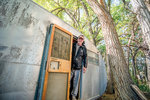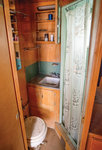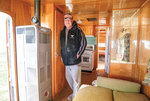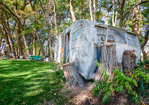Cloudy, 26° F
Russell Schwarz started knocking on Beryl and Winston Churchill’s door years ago, inquiring about a 1950s travel trailer seemingly discarded on their Powell property. Encased in a tangle of …
This item is available in full to subscribers.
The Powell Tribune has expanded its online content. To continue reading, you will need to either log in to your subscriber account, or purchase a subscription.
If you are a current print subscriber, you can set up a free web account by clicking here.
If you already have a web account, but need to reset it, you can do so by clicking here.
If you would like to purchase a subscription click here.
Please log in to continue |
|







Russell Schwarz started knocking on Beryl and Winston Churchill’s door years ago, inquiring about a 1950s travel trailer seemingly discarded on their Powell property. Encased in a tangle of trees and brush, what many saw as rubbish Schwarz saw as opportunity.
The 1952 Spartanette looked rough from the outside to the untrained eye. The exterior aluminum shell was scratched and dull from 70 years of exposure and wind, which pushed the branches of elm tree saplings across the surface in great swooshes. Over the years, some of the trees grew to maturity, twisting the metal in places and encapsulating the hitch and even the propane tank.
To Schwarz’s surprise, however, the interior was dusty, but near perfect. Wood paneling glowed a luxurious golden hue and the appliances and furniture looked barely used.
“I’ve never seen one this nice,” Schwarz said. “It’s amazingly well preserved.”
Princeton University purchased the Spartanette for field researchers roughly seven decades ago. At the time, Professor of Vertebrate Paleontology Glenn Jepsen was bringing field crews to Polecat Bench to study the creatures that lived in the area 66 million to 56 million years ago.
A friendship developed between Jepsen and Thelma and Fred Churchill — Winston’s parents — as the farm was close to the campsite and had accessible potable water. Soon, Jepsen moved the Spartanette to the Churchills’ property to house research groups from not only Princeton, but Harvard, Dartmouth and other East Coast institutions.
Some of the crew also stayed in the Churchill home and Thelma cooked for the group for many years, Beryl Churchill said.
“If only [the Spatanette] could talk ...,” she said.
In 1971, the trailer’s title was transfered to Winston Churchill for “the privilege of keeping the trailer on the property.” Jepsen was so taken by the hospitality, that he named a discovery after the city: A fossil of a small rodent from the Paleocene age, called a multituberculate, is officially known as Ectypodus Powelli.
Jepsen died in 1974, but the scientific studies continued into the ’80s. The teams grew so large that they moved camps to the Bench and visiting professors and students would only stay in the trailer occasionally. Visitors stopped coming soon after and the Spartanette went unused for 15-20 years.
Though the scientists now stay in other accommodations, the relationship between the important paleontological sites on Polecat Bench, the Churchill family and the Powell community continues. For the past 61 years, the Churchills have hosted an Independence Day celebration for the crews. Many of the students who stayed in the trailer are now professors themselves and have very fond memories of their stays in the Spartanette and in Powell.
Schwarz spent years trying to buy the trailer, and said Winston and Beryl only gave in to his offer when they realized the importance of preserving its history, giving it a new life with equally fond chapters. Leaving it sit would have been the end of its long storied life, eventually being damaged beyond repair by the ravages of time.
Schwarz and partner Darin Wood arrived at the farm early this month to free the Spartanette from its long-term home and move it to a Cody workshop. It was easier said than done.
Wood went to work cutting the trailer from the tangle. The many mature trees made for long days of work, especially the tree that had grown around the hitch. Schwarz was intent on not damaging the trailer during the removal, wanting to preserve the story of the Spartanette’s previous life.
He’s had a passion for vintage trailers for years — long before it became fashionable to refurbish the relics.
Travel trailers became popular shortly after World War II — a time when things were built to last and the U.S. economy was bursting at the seams. Manufacturers that built military aircraft were looking for alternative revenue sources. The result was homes on wheels, Schwarz said.
“Most of these companies started right after the war,” he said. “They were faced with the question, ‘So what do we do now? Well, we’ve got all these guys coming home. Let’s start building trailers.’”
At about the same time, American vehicles were being produced with more power. It was the perfect storm for folks to hit the road with the comfort of home in tow. The build quality was amazing.
“In essence, it’s an aircraft on wheels,” Schwarz said.
He first fell in love with trailer homes out of necessity. He was moving to Cody to manage the Days Inn and thought it would be cheaper to buy a vintage travel trailer than renting a U-Haul. When the move was complete, he sold it to a fellow traveler.
“I doubled my profit on the trailer and saved the money I would have spent renting a U-Haul,” Schwarz said.
Soon he bought another trailer, then another. He’s refurbished many dozens in the past decade, including very rare models from the mid-1950s. Schwarz has scoured the Big Horn Basin for years, luckily doing so before television shows like “Flippin’ RVs” and “Rock My RV” inspired handy, adventurous souls to hunt for the hidden gems. He’s also traveled hundreds of miles for rare models.
Schwarz has purchased a few trailers that couldn’t be salvaged. But he has no doubt the Churchills’ Spartanette will live on after a year or two of work and restoration.
“It will shine up like glass,” he said.